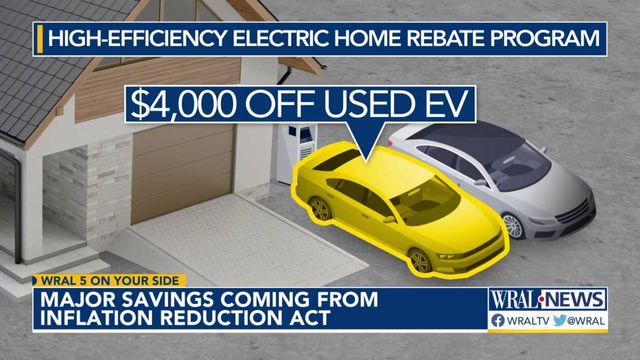Here's how to get major savings from new tax credits and rebates
The Inflation Reduction Act could save you thousands of dollars in tax credits and rebates. The act creates some new programs and updates other existing programs.
Posted — UpdatedYour browser doesn't support HTML5 video.
The Inflation Reduction Act could save you thousands of dollars in tax credits and rebates. The act creates some new programs and updates other existing programs. Below are a few of those programs and some of the specific guidelines you have to follow to take advantage of them.
This extends the federal income tax credit of up to $7,500 on a new electric vehicle until the end of 2032. Starting in 2023, there will be new credits for previously-owned clean vehicles of 30% of the price or $4,000, whichever is less. However, there are limits on car price, buyer income and manufacturing requirements. Those limits may make many new cars ineligible for the credit.
Requirements:
FOR NEW CARS
-Final assembly of the new car must take place in North America.
-Starting in 2023, there are requirements for the source of a car battery’s critical minerals and its components. A certain percentage need to come from the U.S. or elsewhere in North America and that percentage changes each year. You lose half of the tax credit if the new vehicle doesn’t meet one of those requirements or you lose the full $7,500 if neither are met.
-Sedan MSRP must be below $55,000.
-SUV, Truck, Van MSRP must be below $80,000.
-Must make under $150,000 individual, $300,000 couples filing jointly, $225,000 individuals filing as head of household.
FOR USED CARS
-Vehicle must be at least 2 model years old.
-There is a price cap of $25,000.
-Buyer must make under $75,000 individual, $150,000 couples filing jointly, $112,500 individuals filing as head of household.
These tax credits will cut the cost of installing rooftop solar for a home by 30%. This is retroactive to the beginning of 2022 and runs through the end of 2032. It helps cover the cost of a new system and installation.
A 30% tax credit, worth up to $1,200 a year. This applies to the cost of installing energy-efficient exterior doors, windows, skylights and insulation, and other items. There is a higher annual cap of $2,000 for heat pumps, heat pump water heaters and biomass stoves and boilers. The new rules for this credit start in 2023 and extend through 2032.
-This program has been known as the Nonbusiness Energy Property Credit but is being renamed the Energy Efficient Home Improvement Credit.
Additionally:
The annual limits for specific types of qualifying improvements will be:
-$150 for home energy audits.
-$250 for any exterior door ($500 total for all exterior doors) that meet applicable Energy Star requirements.
-$600 for exterior windows and skylights that meet Energy Star most efficient certification requirements.
-$600 for other qualified energy property, including central air conditioners; electric panels and certain related equipment; natural gas, propane, or oil water heaters; oil furnaces; water boilers.
-$2,000 for heat pump and heat pump water heaters; biomass stoves and boilers. This category of improvement is not limited by the $1,200 annual limit on total credits or the $600 limit on qualified energy property.
-Roofing will no longer qualify.
People can get up to $8,000 in rebates for cutting home energy usage through efficiency upgrades. Overall savings depend on energy reduction and household income level. This program is not yet in place
People can get up to $14,000 in total rebates. $840 for electric stoves and electric heat pump clothes dryers, $1,750 for heat pump water heaters, $8,000 for heat pump for space heating or cooling. Upgrades for electrical wiring also qualify. People making 0%-80% of an area’s median income can get the full cost of these purchases covered. People making 80%-150% of an area’s median income can get 50% of the cost covered. This program is not yet in place.
Right now, we don’t know exactly when these two rebate programs will start. North Carolina’s Department of Energy is waiting for more guidance on how to implement both rebate programs.
• Credits
Copyright 2024 by Capitol Broadcasting Company. All rights reserved. This material may not be published, broadcast, rewritten or redistributed.
